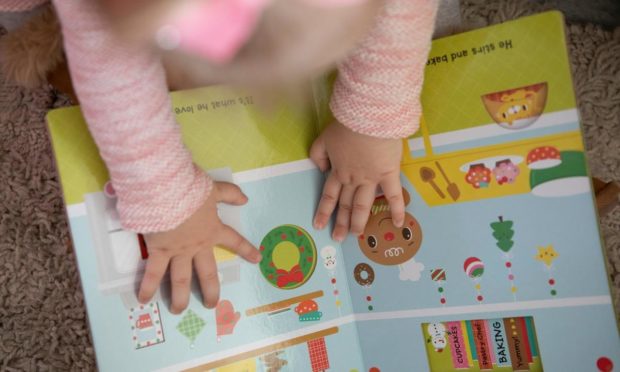New figures for Dundee and Fife have shown child poverty has increased, with 24 per cent of kids in Scotland in poverty.
Child poverty has risen in every local authority across Scotland since 2015, according to the new report by the End Child Poverty coalition.
The research shows child poverty was increasing across Scotland even before the coronavirus pandemic, Save the Children said.
No complacency
Some 24 per cent of children still live in poverty in Scotland, the figures showed.
Whilst Scotland has lower levels of child poverty than Wales and England, campaigners warned there can be no room for complacency if statutory child poverty targets agreed by all the Holyrood parties are to be met.
The research by Loughborough University, on behalf of the End Child Poverty coalition, shows that, even before the pandemic, levels of child poverty in Scotland ranged from nearly one in six children in the Shetland Islands and East Renfrewshire to nearly one in three in Glasgow – once housing costs are taken into account.
Local figures
Child poverty in Dundee, Angus, Fife and Perth, and Kinross all recorded a rise based on 2015 levels, according to the research.
This varied from a rise of 3 per cent in both Dundee and Angus to 2.1 per cent in Fife.
Perth and Kinross recorded a rise of 2.7 per cent.
Speaking on behalf of members of End Child Poverty, John Dickie, director of the Child Poverty Action Group in Scotland, said: “Solid foundations have been laid in Scotland for future progress on child poverty, not least the introduction of the Scottish child payment and an increasing focus on action at local level.
“But this new data is a stark reminder that child poverty was still rising in every part of Scotland, even before the pandemic struck. The challenge now is for government at all levels to use every power they have to boost family incomes and reduce the costs that struggling parents face.
“The new Scottish Parliament must act on election promises and make tackling child poverty its top priority.
“The cross party commitment to at least doubling the Scottish child payment needs to be implemented as a matter of utmost urgency in order to help meet the 2023/24 targets. But child poverty also needs to be a priority at local level.
“Local powers, including over economic development, housing and welfare, must be used to maximum effect to ensure all families have a disposable income fit for giving children a decent start in life.”
What local leaders and the Scottish Government said
Responding to the report, the Scottish Government said it was not complacent.
A spokesperson said: “We are providing support worth about £5,000 by the time a child turns six through the Best Start Grant, Best Start Foods and Scottish Child Payment.
“This payment, worth £40 every four weeks, is already reaching thousands of families on low incomes – we are working to deliver it to all eligible children under 16 by the end of 2022 and doubling the value of the payment by the end of this Parliamentary term.
“The 2021-22 Scottish Budget commits further investment to tackle child poverty, including £100 million to support struggling families through new Pandemic Support Payments and £49.75 million for expanded free school meal support.
“These statistics highlight that, even before the pandemic began, the challenge of negotiating the UK’s welfare system has left many people in desperate need of help. The UK Government must act now to match our action and commit to making permanent the £20 uplift to Universal Credit, and extend this to people on other benefits.”
Fife Council
Head of Fife Council’s Community and Neighbourhood services Paul Vaughan commented: “The economic impact of the coronavirus pandemic and lockdown has hit vulnerable people and families hard.
“Working together with partners NHS Fife and third sector organisations across Fife we are listening to families, understanding their needs and responding effectively with whatever support is needed.
“Longer term as we begin to recover from the pandemic, our focus has to be improving people’s chances of getting a job, accessing the benefits they are entitled to and creating a decent standard of living for every child in Fife.”
Angus Council
Margo Williamson, chair of the Angus Community Planning Partnership said: “We continue to work on reducing child poverty and put this work at the heart of everything we do.
“The Local Child Poverty Action Report is published every year to show the challenges and how we as a partnership are working together to support local families.”
Dundee City Council
Councillor Stewart Hunter, Dundee City Council’s children and families convener, told The Courier that the figures were “too high” across the country.
He said: “The Scottish Government and Dundee City Council are committed to tackling child poverty.
“We have already prioritised our Cost of the School Day programme to support families who are struggling, increased school clothing payments and, throughout the pandemic, have supported vulnerable families through the free school meal payments.”
He added: “This is not just a Children and Families priority. This is a priority all through the council from the chief executive and council leader down. It will take all of us and every council service to deliver on our commitments to eradicate child poverty and we are committed to doing that”
Perth and Kinross Council
A spokesperson said: “Nationally, a number of issues including low-paid and insecure employment, and more recently COVID-19 have all impacted adversely on the numbers of children and young people affected by poverty. We want to give every child in Perth and Kinross the best start in life, regardless of their family’s circumstances. For that reason, we are continuing with our partners to do all we can to tackle child poverty – just over 1 in 5 children experience poverty and deprivation in Perth and Kinross and that is clearly too many.
“We are already working hard to ensure 2000 families affected by child poverty have welfare benefits checks to boost their income. Additionally, we are providing employability support for parents to help them to find better paying and more stable jobs. This includes setting up two Skills Academies in Hospitality and Construction to help 200 parents and young people get the skills they need to secure the jobs they want. Alongside this, our affordable rents offer and investment in warm homes ensures that we are doing all we can to reduce the cost of living for affected families who are Council tenants.“

